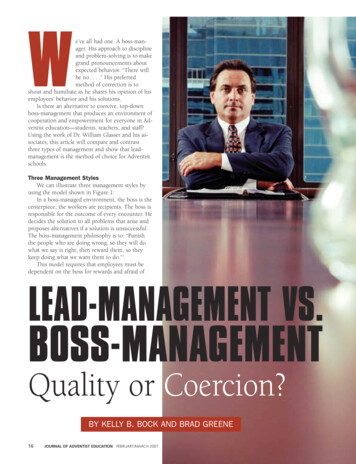
Transcription
WHITE PAPERBossy: What’s Gender Got to Do with It?By: Cathleen Clerkin, Christine A. Crumbacher, Julia Fernando, and William A. (Bill) Gentry
ContentsExecutive Summary1Why the Buzz about Bossy?2Understanding the B-word4Bossy by Any Other Name8Double Standards in Women’s Leadership10Comparing Our Findings to the Ban Bossy Campaign12References16About the Research16Endnotes16About the Authors17
Executive SummaryIn light of the recent interest in the word “bossy” and the Ban Bossy campaign, the Center forCreative Leadership (CCL ) conducted research on the role of the word bossy in the workplace.We discovered: Bossy is not a synonym for assertiveness, or other positive executive leadership skills. Women are called bossy in the workplace more often than men are. Bossy coworkers are described as unpopular and unlikely to be successful in the future,and bossy women coworkers are seen as more unpopular and less successful comparedto bossy men coworkers. When we look at bossy behaviors—without the bossy label—men are just as likely aswomen to act bossy in the workplace. Acting bossy is related to being seen as less promotable by bosses for both men andwomen. However, the relationship was stronger for women.Altogether, our results show a consistent trend that being bossy in the workplace has negativeconsequences, and those consequences are particularly harsh for women. 2015 Center for Creative Leadership. All rights reserved.1
This photo is reprinted courtesy of Ban Bossy and LeanIn.Org.Why the Buzz about Bossy?The word bossy and its link to leadership has beenheavily discussed lately due to the Ban Bossy campaignfounded by Facebook COO Sheryl Sandberg and backedby world renowned women leaders and luminariessuch as Condoleezza Rice, Anna Maria Chávez, MichelleObama, and Beyoncé. The campaign argues that from ayoung age, girls are trained to be quiet and submissive,and when they break these gender norms, they are oftencriticized, disliked, and called bossy—a word that candiscourage girls from growing up to be leaders. Indeed,there is evidence that by middle school, girls are alreadyless interested in leadership, and one of the reasons thatgirls give for avoiding leadership roles is that they areworried about being called bossy (banbossy.com).The Ban Bossy website sums up this research byproclaiming: “When a little boy asserts himself, he’s called a‘leader.’ Yet when a little girl does the same, she risks beingbranded ‘bossy.’” The campaign concludes that banningbossy is important because we cannot expect women togrow up to lead if we “discourage the very traits that getthem there” and advocates correcting others by saying,“That girl’s not bossy. She has executive leadership skills.”(Sandberg & Chavez, 2014).Does the bossy label follow women from the playground to the workplace?In a recent Wall Street Journal article, Sheryl Sandberg and Ann Maria Chávez (2014) argue that the wordbossy is not just a playground insult. They state: The earliest citation of bossy in the Oxford English dictionary refers to a sentence from1882 stating “There was a lady manager who was dreadfully bossy.” Use of the word bossy peaked in the 1930s (when women were often accused of“stealing” male jobs) and in the 1970s (when the women’s movement led to an increaseof women in the workplace). When Sandberg visited Howard University and asked women whether they were calledbossy as children, one woman answered, “During my childhood? How about last week!”.2 2015 Center for Creative Leadership. All rights reserved.
Yet little empirical research has been conducted about the word bossyas it pertains to women leaders in workplace. In this white paper, we setout to answer five questions based on the Ban Bossy campaign,When it comes to the workplace . . .1. Is bossy a label for assertiveness and executive leadership skills?2. Are women called bossy more often than men?3. Does being seen as bossy affect men and women’s reputations?4. Do women act bossier than men do?5. Is there a penalty for acting bossy? And if so, are only women punished? 2015 Center for Creative Leadership. All rights reserved.3
Understanding the B-wordTwo hundred and one US leaders (100 men, 101 women) from a survey panel sharedtheir experiences with the word bossy in the workplace (For more information abouthow this research was conducted, please see the About the Research section at theend of this paper).Is bossy a label for assertiveness and executive leadership skills?In order to determine whether the word bossy is code for assertiveness and leadership skills orwhether it really means something else, we asked leaders to define bossy in their own words.There was substantial agreement about what the word means. Overall, the six key indicators ofbossiness were:i1. Bossy people control others and dictateorders.2. Bossy people ignore others’ perspectives.3. Bossy people are rude and pushy towardsothers.4. Bossy people micromanage and prescribespecific actions (e.g., saying exactly how orwhen something should be done).5. Bossy people are focused on authority,power, and status.6. Bossy people interact in aggressive ways.The word assertive was notably absent fromthe definitions given by leaders. It only cameup twice in all 201 definitions (that’s less than1%), and both definitions seemed to describesomeone who is actually not very successful atbeing assertive, i.e. “overly directive, assertivebehavior . . .” “. . . micromanagers may think thatthey are only being assertive . . .” It seems thatbeing bossy—at least in the workplace—isnot the same as just showing assertiveness.4 2015 Center for Creative Leadership. All rights reserved.Rather, the word bossy seems to describe apattern of poor interpersonal skills. This is aserious problem in the workplace, as CCL’sresearch has shown that failing to manageinterpersonal relationships at work predictsleadership derailment—the situation in whichhigh-potential leaders end up getting fired orbarred from promotion (Gentry, 2010; Gentry& Chappelow, 2009; Hogan, Hogan, & Kaiser,2010). Therefore, it seems safe to conclude thatthe word bossy is not indicative of executiveleadership skills—at least not positive ones.
Are women called bossy more often than men?We found that 33% of women and 17% of men reported thatthey have received feedback that they are bossy at work.ii Inother words, women were twice as likely to be brandedbossy in the workplace. Yet, when leaders were asked to recalla time they worked with someone else whom they consideredbossy, they were about equally likely to describe a man (48%)or a woman (52%).iii Men were more likely to describe bossymen coworkers, while women were more likely to describebossy women coworkers.iv 2015 Center for Creative Leadership. All rights reserved.5
Does being bossy affect men’s and women’s reputations?Our survey panel of leaders was asked to think of a particular bossy coworker, andkeeping them in mind, rate them on a number of work-related attributes and outcomes.In general, people had low opinions of their bossy coworkers, and these opinions wereeven lower if the coworker was a woman. Both women and men bossycoworkers were seen as fairlyunlikable, unpopular, andunsuccessful. [For more about thesefindings, see the CCL white paperHow to Be the Boss without Being theB-word (Bossy).] Bossy women coworkers were ratedas less likely to have successfulcareers in the future compared tobossy men coworkers (taking intoaccount the baseline competence ofthe coworker).vi Bossy women coworkers are ratedas less popular than bossy mencoworkers. About 32% of bossywomen were seen as “not at allpopular” while only about 19% ofmen were rated the same.vIn sum, neither bossy women nor bossy men are seen as superstars in their organizations.Being bossy damages men’s reputations as well as women’s reputations; however, ithurts women more.6 2015 Center for Creative Leadership. All rights reserved.
2015 Center for Creative Leadership. All rights reserved.7
Bossy by Any Other NameThe results above illustrate how the word bossy may be gendered in the workplace. But dowomen actually act more bossy in the workplace? And if they do, does it actually damagetheir careers? To answer these questions, we looked at CCL’s archival BENCHMARKS datafrom the past 20 years (See About the Research section on page 16).BENCHMARKS does not contain questions about the word bossy, but it does includeratings of leaders’ arrogance, discounting others’ contributions, and bullying—measuressimilar to the indicators of bossy that we discovered in our research. By examining genderdifferences in these ratings, we are able to look at bossy behaviors without using the bossylabel. Our archival data also allows us to look at boss’s ratings of promotability in order to seewhether bossy people were actually seen as promotable or not within their organizations.Do women act bossier than men do?Contrary to what some might believe, we found women do not act bossier than men; thisis true whether we look at self-report ratings of bossiness, or those reported by directreports or bosses.vii This supports the Ban Bossy argument that women get called bossyfor doing the same behaviors as men. In other words, even though women are twice aslikely to be called bossy at work, they are not more likely to act bossy. This shows thatexhibiting bossy behaviors is not a feminine trait. If anything, the data showed that menactually exhibited slightly more bossy behaviors compared to women.Is there a penalty for acting bossy? And if so, are only women punished?For both men and women, bossy behaviors wererelated to being seen as less promotable byone’s boss.viii In other words, both genders arepunished for acting bossy in the workplace.However, the link between being bossy andbeing unpromotable was stronger for women.This means that, when women act bossy in theworkplace, it has more serious consequencesthan when men do.8 2015 Center for Creative Leadership. All rights reserved.This pattern is consistent across our 20 years ofdata. In fact, looking at this trend across time, thegender gap is actually widening. Twenty yearsago, the relationship between being bossy and notbeing promotable was about the same for men andwomen.ix Today, the relationship between beingbossy and not being promotable is significantlystronger for women than it is for men.x
2015 Center for Creative Leadership. All rights reserved.9
Double Standards inWomen’s LeadershipWhile these results seem unfair, they would not surprise women’sleadership scholars. Decades of research shows that there are genderbiases in leadership, and women often face a “double-bind” in theworkplace (Eagly & Karau, 2002; Jamieson, 1995). When people thinkof leaders, they tend to think of men and stereotypically masculinetraits (e.g., independence, aggression, competitiveness). Yet women aregenerally still expected to conform to stereotypically feminine traits (e.g.,nurturing, nice, altruistic) in the workplace. This leads to a “double-bind”in which women who exhibit feminine traits are seen as lacking strongleadership qualities, while women who exhibit masculine traits are seen asunfeminine, mean, and unlikable.Given this, it seems that bossy might just be yet another way to penalizewomen who take on leadership positions and/or who act aggressively. Formore information about the double standards faced by women leaders,see Harvard Business Review’s recent Women Rising: The Unseen Barriers.10 2015 Center for Creative Leadership. All rights reserved.
2015 Center for Creative Leadership. All rights reserved.11
Comparing Our Findingsto the Ban Bossy CampaignThe Ban Bossy campaign wants to ban the word bossy in order to encourage young girls to lead(banbossy.com). At CCL, we aimed to discover whether the word bossy continues to harm women afterthey have left the playground. In line with the Ban Bossy campaign, we found that the word bossy hasa negative connotation, and is disproportionately used against women in the workplace. Specifically:Women were more likely to be called bossy in the workplace, even though men were just aslikely to display bossy behaviors.Women coworkers who were viewed as bossy were seen as less successful and less popularthan bossy men coworkers.Behaving in bossy ways was more strongly related to being unpromotable for womencompared to men.However, our research also uncovered some results that were inconsistent with the current Ban Bossycampaign. Ban Bossy states that the word bossy is leveled only against girls who are assertive andshow leadership skills, and that girls are punished for these behaviors while boys are not. We foundthat, at least in the workplace, this is not the case. Specifically:The word bossy was used to describe people who show a lack of interpersonal leadershipskills—e.g., someone who is controlling, dictating, ignores others, micromanaging,prescribing, rude, pushy, authority-focused, and aggressive.While the label does seem to be disproportionately aimed towards women, people alsoconsidered many men coworkers to be bossy as well.Men who are labeled as bossy or who act in bossy ways are not rewarded in the workplace.They too are seen as unpopular, unsuccessful, and unpromotable—just to a lesser extentcompared to women.12 2015 Center for Creative Leadership. All rights reserved.
2015 Center for Creative Leadership. All rights reserved.13
What do these results mean for today’s leaders?Our findings show that being bossy is a signof bad leadership. Therefore, leaders shouldmake an effort to avoid being bossy at workregardless of gender. [For advice on how toavoid being bossy in the workplace, and fortips on how to work with bossy coworkers,please see the CCL white paper How to Be theBoss without Being the B-word (Bossy).]We find that interpersonal skills matter inthe workplace, and that leaders who havestrong interpersonal skills are more likelyto g
you are in the eyes of your own boss. This is another piece of evidence of the negative repercussions of being bossy in the workplace. Being Bossy Being Promotable Our survey panel of 201 leaders also shared their perceptions of their bossy coworker and made predictions about the bossy coworker’s future career:ii Around 80% said they didn’t like the bossy coworker. 91% said the .











